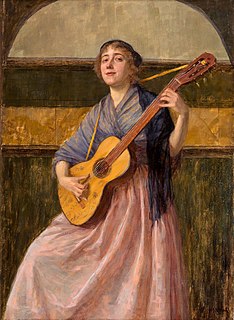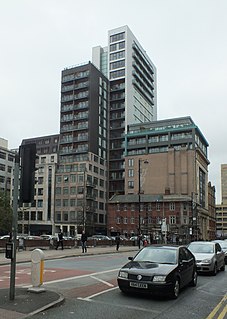
A ballad is a form of verse, often a narrative set to music. Ballads derive from the medieval French chanson balladée or ballade, which were originally "dance songs". Ballads were particularly characteristic of the popular poetry and song of Britain and Ireland from the Late Middle Ages until the 19th century. They were widely used across Europe, and later in Australia, North Africa, North America and South America. Ballads are often 13 lines with an ABABBCBC form, consisting of couplets of rhymed verse, each of 14 syllables. Another common form is ABAB or ABCB repeated, in alternating eight and six syllable lines.

Robin Hood is a legendary heroic outlaw originally depicted in English folklore and subsequently featured in literature and film. According to legend, he was a highly skilled archer and swordsman. In some versions of the legend, he is depicted as being of noble birth, and in modern retellings he is sometimes depicted as having fought in the Crusades before returning to England to find his lands taken by the Sheriff. In the oldest known versions he is instead a member of the yeoman class. Traditionally depicted dressed in Lincoln green, he is said to have robbed from the rich and given to the poor.

Lancashire is a county in North West England. Lancashire is a historic, ceremonial and non-metropolitan county and the county boundaries differ between these different forms. Its county town is Lancaster. The non-metropolitan county was created by the Local Government Act 1972 and is administered by the Lancashire County Council and twelve district councils. Its administrative centre is Preston. The ceremonial county also includes the districts of Blackpool and Blackburn with Darwen, with a population of 1,449,300 and an area of 1,189 square miles (3,080 km2).

The Yorkshire dialect is a dialect, or continuum of dialects, spoken in the Yorkshire region of Northern England. The dialect has roots in Old English and is influenced by Old Norse. The Yorkshire dialect has faded and faces extinction, but organisations such as The Yorkshire Dialect Society and the East Riding Dialect Society exist to promote its use.
Glodwick is an area of Oldham, Greater Manchester, England. It is south-east of Oldham town centre.

Greenfield is a village in the civil parish of Saddleworth in the Metropolitan Borough of Oldham, in Greater Manchester, England.Ir is 4 miles (6.4 km) east of Oldham, and 13 miles (21 km) northeast of Manchester. It lies in a broad rural area at the southern edge of the South Pennines. To the east of the village Dovestone Reservoir, Chew Reservoir and Greenfield Reservoir lie in the Peak District National Park.

Lancashire is a county of England, in the northwest of the country. The county did not exist in 1086, for the Domesday Book, and was apparently first created in 1182, making it one of the youngest of the traditional counties.

A broadside is a single sheet of inexpensive paper printed on one side, often with a ballad, rhyme, news and sometimes with woodcut illustrations. They were one of the most common forms of printed material between the sixteenth and nineteenth centuries, particularly in Britain, Ireland and North America and are often associated with one of the most important forms of traditional music from these countries, the ballad.

A broadside is a large sheet of paper printed on one side only. Historically, broadsides were used as posters, announcing events or proclamations, commentary in the form of ballads, or simply advertisements.
Four Loom Weaver, probably derived from "The Poor Cotton Weaver" is a 19th-century English lament on starvation. One source also names it Jone o Grinfilt though this title usually refers to different lyrics and score, which is about the naiveté of country folk. Actually, it is very similar to Jone o'Grinfilt Junior which can be found in John Harland's Ballads and Songs of Lancashire. Jone o Grinfilt is believed to have been written by Joseph Lees of Glodwick, near Oldham in the 1790s.

The Cumberland dialect is a local Northern English dialect in decline, spoken in Cumberland, Westmorland and surrounding northern England, not to be confused with the area's extinct Celtic language, Cumbric. Some parts of Cumbria have a more North-East English sound to them. Whilst clearly spoken with a Northern English accent, it shares much vocabulary with Scots. A Cumbrian Dictionary of Dialect, Tradition and Folklore by William Rollinson exists, as well as a more contemporary and lighthearted Cumbrian Dictionary and Phrase Book.

The Lancashire dialect or refers to the Northern English vernacular speech of the English county of Lancashire. The region is notable for its tradition of poetry written in the dialect.

"The Dowie Dens o Yarrow", also known as "The Braes of Yarrow" or simply "Yarrow", is a Scottish border ballad. It has many variants and it has been printed as a broadside, as well as published in song collections. It is considered to be a folk standard, and many different singers have performed and recorded it.

Piethorne Brook is a watercourse in Greater Manchester. It is a tributary of the River Beal.

Harry Boardman (1930–1987) was an English folk singer who was born in Failsworth, Lancashire. He sang both unaccompanied and accompanying himself on the Anglo concertina or banjo. "Boardman has specialised in the lore, songs and dialect poems of his native Lancashire. A fine singer, his recorded and printed work has done much to preserve the otherwise ignored aspects of his local tradition."—Fred Woods. He was active as a folk singer and collector of Lancashire folklore from the late 1950s with some collaboration from his wife Lesley. In 1991 the Harry Boardman Memorial Trust was established to increase public awareness of traditional music and related arts, including the folk music of the British Isles and local traditions of North West England. Harry appeared regularly, together with Dave Hillery and Terry Whelan at the Wayfarer's Folk Club, at various locations, including the Pack Horse Hotel in Bridge Street, Manchester from the late 1950s. Boardman was a folk club organiser from 1954 until the year he died; the home of his club in the 1970s and 1980s was the Unicorn Hotel in Church Street, Manchester. His interest in the songs of working folk came from his socialist beliefs.
Manchester Oldham Road station opened in 1839 as the terminus station of the Manchester and Leeds Railway (M&LR) in Collyhurst, Manchester. When the M&LR opened Manchester Victoria in 1844 as its new Manchester passenger station Oldham Road was converted to a goods station which it remained until its closure in 1968.

Mancunian is the accent and dialect spoken in the majority of Manchester, North West England, and some of its environs. It is also given to the name of the people who live in the city of Manchester. It has been described as 'twangy' whilst also being labelled 'euphonic' and has been voted as sexiest accent in England. Additionally it has been claimed Mancunian is one of the most desireable and friendliest accents in the UK.
Joseph Lees may refer to:
James Butterworth also known as Paul Bobbin was an English author, poet, antiquarian and topographer of Manchester and the surrounding area.
"When Jones' Ale Was New" is an English folk song about men of various trades drinking at an ale-house or tavern. Other titles include "Joan's Ale is New" and "When Johnson's Ale Was New". Originating in the 16th century CE it has been collected frequently from traditional singers in England, and has been found occasionally in Scotland and the USA. It has evolved over the years, and is popular as a chorus song in folk clubs in England.













